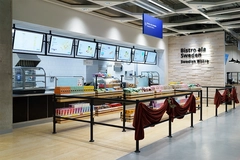
- Industry news
Industry news
- Category news
Category news
- Reports
- Key trends
- Multimedia
- Journal
- Events
- Suppliers
- Home
- Industry news
Industry news
- Category news
Category news
- Reports
- Key trends
- Multimedia
- Events
- Suppliers
Sustainable ingredients: From sourcing to on-pack claims, consumer awareness fuels F&B transparency

Global consumer calls for sustainability are compelling international F&B players to rethink ingredient sourcing and production strategies. But as climate change and geopolitical events continue to disrupt supply chains, industry experts warn the context for agricultural raw material production has become “more complex.”
With changing consumer expectations around clean labels and transparency and tighter food safety regulations, especially in the EU, the shift from established practices to more modern and sustainable methods is equal parts urgent and challenging.
Food Ingredients First speaks with ADM and Symrise to understand how companies are adapting to a growing demand for sustainable ingredients, the challenges they face and the role of partnerships and technology in facilitating change.
Sustainability starts at sourcing
Célia Cholez, global sustainability manager at Symrise Food & Beverage Naturals says with growing calls for transparency, ingredient sourcing offers a renewed opportunity to incorporate sustainability in operations.
“We have clear sustainable sourcing objectives, focused on rigorous long-term risk assessment and monitoring. We work with recognized platforms such as Sedex and Ecovadis to assess our suppliers. This responsible approach enables us to assess their performance on crucial factors such as human rights, environmental impact, health and safety, business integrity and other ethical considerations.”
“To take it a step further, for fresh agricultural raw material, we rely on the Sustainable Agriculture Initiative platform’s Farm Sustainability Assessment with the commitment to increase the level of sustainability in our strategic supply chains (targeting Gold or Silver status).”
Digitalization, Cholez adds, makes it possible to track indicators directly from the field. These include carbon emissions and water use, enabling Symrise to support suppliers with multi-year commitments to sustainability.
 Digitalization, Symrise’s Célia Cholez says, makes it possible to track indicators directly from the field (Image credit: Symrise).At ADM, sustainability translates to developing solutions that “feed the world while making a difference for our communities and ecosystems,” according to Michelle French, senior director, Global Sustainability Programs.
Digitalization, Symrise’s Célia Cholez says, makes it possible to track indicators directly from the field (Image credit: Symrise).At ADM, sustainability translates to developing solutions that “feed the world while making a difference for our communities and ecosystems,” according to Michelle French, senior director, Global Sustainability Programs.
The company ensures that its ingredients comply with internal standards and policies for human rights, protection of forest land, biodiversity and community.
“With vast global supply chains, we work with industry associations, peer groups and NGOs to ensure our initiatives support transparency and traceability efforts. We’re progressing toward our goal of deforestation-free supply chains by the end of 2025,” says French.
She cites the example of the ADM’s palm supply chain, within which it sources from suppliers who have policies to protect forests, peatlands and human rights. The company implements this through the No-Deforestation, Peat or Exploitation Integrated Reporting Framework.
The American multinational has various regenerative agricultural projects spanning corn, soy, wheat, canola, sorghum, peanuts and barley. French notes that in last year, such projects reduced the company’s Scope 3 GHG footprint by 310,000 metric tons of CO2e and models showed 263,700 metric tons of CO2 sequestered.
Partnering with “stewards of the land”
Both ADM and Symrise highlight key partnerships with local farmers to decarbonize supply chains and drive regenerative agriculture practices that focus on replenishing the soil and increasing the resilience of the environment.
“We know sustainability within ingredient sourcing starts with the stewards of the land — the farmers and growers — and we see regenerative agriculture as a crucial component to supporting the environment,” notes French.
“We’re supporting connections between our downstream customers like PepsiCo, Mars, Carlsberg, Ooni Pizza Ovens and the JM Smucker Co. with our farmer partners.”
She says an example is ADM’s collaboration between its wholly-owned peanut processing subsidiary Golden Peanut, JM Smucker Co. and the National Black Growers Council to advance regenerative agriculture practices across 20,000 peanut acres in the southeast US.
“This three-year agreement is empowering peanut farmers with tools, technical expertise and financial support to help strengthen their businesses and expand the supply of regeneratively grown peanuts. We recently announced a partnership with Ooni Pizza Ovens through which we’re helping bring a new exclusive line of flour to consumers by working with UK farmers to source wheat grown using regenerative practices.” “We know sustainability within ingredient sourcing starts with the stewards of the land — the farmers and growers,” says ADM’s Michelle French (Image credit: ADM).
“We know sustainability within ingredient sourcing starts with the stewards of the land — the farmers and growers,” says ADM’s Michelle French (Image credit: ADM).
Similarly, Cholez cites Symrise’s decade-long partnership with 7,000 smallholder vanilla farmers in Madagascar, whose cultivation practices the company supports in the “biodiverse and fragile mountainous landscape.”
“Our partnership is unique, with our team working on-site year-round and has achieved UEBT RA certification for vanilla and other botanicals. This collaboration, Bridging The Gap project, co-funded with Unilever and GIZ extends sustainability beyond vanilla cultivation, to encompass education, economic development on other local crops, etc.”
In a similar program in the East of France, Symrise is involved in a five-year-long initiative across the value chain, where farmers cultivate carrots for the baby food industry. Climate change, securing yields and ensuring a sustainable supply chain are the key focus areas of this partnership.
These transitions, however, come with challenges. As Cholez highlights, fluctuating yields, upfront investments in new equipment and time for farmer training, affect sourcing and how sustainable it can be.
“A key challenge lies in helping farmers shift from long-established practices to new methods. Changing farming practices can cause surprising results, as no miracle recipe exists. To manage this, we provide technical and financial support, phase in changes gradually and conduct trials before broader implementation.”
Water and energy efficiency
ADM’s French says that according to research, 77% of Gen Z and 72% of Millennials say food, drink and supplement brands should be doing more to protect the planet globally. Stronger calls for sustainability mean that consumers are scrutinizing companies’ water and energy consumption.
Responding to this, ADM is pursuing a goal of scaling renewable and low-carbon energy use to 25% of total energy usage by 2035 and an energy intensity goal of reducing energy per metric ton of product produced by 10% by 2035.
“Our US flour milling operations are net carbon neutral, which we achieved through the implementation of projects focused on reducing energy usage and intensity, the purchase of electricity and by compensating for the remaining emissions through carbon capture and storage technology,” French notes.
 Stronger calls for sustainability mean that consumers are scrutinizing companies’ water and energy consumption.“Several projects and technologies are supporting our target of 10% absolute reduction in water withdrawal over a 2019 baseline by 2035. This includes upgrading our reverse osmosis backwash water reuse system in our Tianjin, China facility; implementing an automation system at our Cedar Rapids, Iowa corn facility; and installing vacuum pumps to improve cooling water circulation at our Adana, Turkey plant.”
Stronger calls for sustainability mean that consumers are scrutinizing companies’ water and energy consumption.“Several projects and technologies are supporting our target of 10% absolute reduction in water withdrawal over a 2019 baseline by 2035. This includes upgrading our reverse osmosis backwash water reuse system in our Tianjin, China facility; implementing an automation system at our Cedar Rapids, Iowa corn facility; and installing vacuum pumps to improve cooling water circulation at our Adana, Turkey plant.”
Communicating sustainability
In addition to resourcefulness, certifications and labels are playing an increasingly crucial role in driving the development, usage and consumption of sustainable ingredients.
“In a Symrise consumer study, we found out that consumers find certified sustainability and the communication about it relevant. At the same time, they understand only part of the certificates and logos offered. Fairtrade and organic certified products are the top encouraging certificates to drive sustainable purchases in the EAME region, organic also being relevant to North American consumers,” highlights Cholez.
French affirms the importance of “appealing” front-of-pack claims in consumer decision-making.
“This impacts the ways CPGs formulate with new solutions and ingredients. Terms like ‘regenerative agriculture’ are becoming more well known to consumers, and ADM research finds that most US consumers agree they would be more likely to trust and purchase from brands that implement regenerative agriculture programs.”
She anticipates transparency of the origin and growing practices of ingredients to incorporate more information, alongside more responsibly sourced NPD solutions.


















